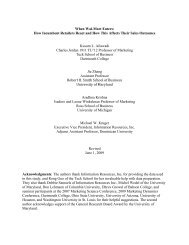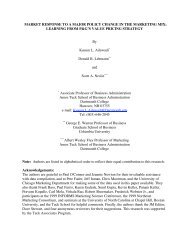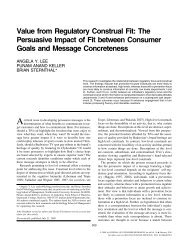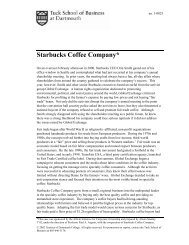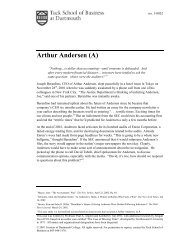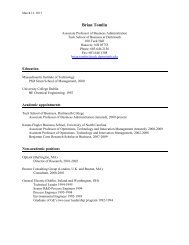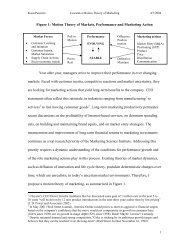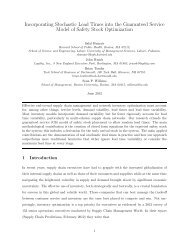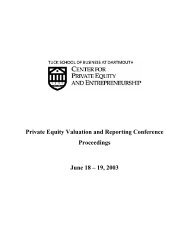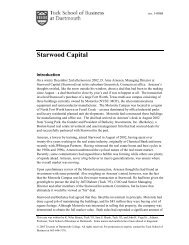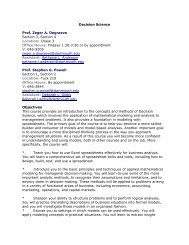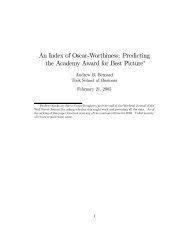tax notes international - Tuck School of Business - Dartmouth College
tax notes international - Tuck School of Business - Dartmouth College
tax notes international - Tuck School of Business - Dartmouth College
You also want an ePaper? Increase the reach of your titles
YUMPU automatically turns print PDFs into web optimized ePapers that Google loves.
Canadian Budget Delivers<br />
Outbound Tax Relief<br />
by Steve Suarez<br />
Canadian Finance Minister Jim Flaherty on January<br />
27 delivered to the House <strong>of</strong> Commons the 2009 federal<br />
budget, which includes improvements to Canada’s<br />
outbound <strong>tax</strong>ation system as well as corporate and individual<br />
income <strong>tax</strong> relief measures. (For prior coverage,<br />
see Doc 2009-1706 or 2009 WTD 16-1.)<br />
The budget is the minority Conservative government’s<br />
first item <strong>of</strong> business since proroguing Parliament<br />
near the end <strong>of</strong> 2008 to avoid being defeated in<br />
the House by the three opposition parties. As TNI<br />
went to press, newly installed Liberal leader Michael<br />
Ignatieff signaled he would support the budget contingent<br />
on the government agreeing to provide quarterly<br />
progress reports starting in March. The other two opposition<br />
parties (the New Democratic Party and the<br />
Bloc Québécois) have already declared their intention<br />
to vote against the budget. Hence, it is likely but not<br />
certain that the budget has the support necessary to<br />
pass the House <strong>of</strong> Commons. 1<br />
Canada has enjoyed exceptional economic performance<br />
over the past several years, running a series <strong>of</strong><br />
budget surpluses and reducing Canada’s debt-to-GDP<br />
ratio to the lowest level in the G-7. However, Canada<br />
is not immune to the dramatic economic downturn<br />
that has swept across the globe over the past year; Flaherty<br />
announced that he anticipates Canada’s real<br />
GDP will contract by 0.8 percent over the next year.<br />
As a result, the budget contains more spending than<br />
<strong>tax</strong>ing, and the government has clearly adopted the<br />
same posture as other G-7 countries (particularly the<br />
U.S.) by embarking on a very substantial spending program<br />
in an effort to stimulate the economy. The budget<br />
contains a wide variety <strong>of</strong> stimulus measures amounting<br />
to about 1.9 percent <strong>of</strong> Canada’s GDP (near the<br />
IMF’s suggested target <strong>of</strong> 2 percent). The measures are<br />
forecast to lead to budgetary deficits totaling over C<br />
$60 billion during the next two years. The budget optimistically<br />
projects a return to budgetary surpluses by<br />
2013 to 2014.<br />
The budget announces some very important changes<br />
to Canada’s outbound <strong>tax</strong>ation system, which would<br />
be improved by withdrawing (or potentially withdrawing)<br />
existing proposed amendments.<br />
1 Current standings in the House <strong>of</strong> Commons are: Conservative,<br />
143; Liberal, 77; Bloc Québécois, 49; New Democratic<br />
Party, 37; Independent, 2. See http://www/parl.gc.ca.<br />
HIGHLIGHTS<br />
Outbound Taxation: A Brief History<br />
Canada’s manner <strong>of</strong> <strong>tax</strong>ing Canadian <strong>tax</strong>payers’<br />
foreign-source income and the entities they invest in<br />
has been in a state <strong>of</strong> flux for almost a decade. First,<br />
very far-reaching and complex rules (the foreign investment<br />
enterprise and nonresident trust (NRT) rules)<br />
were announced in 1999 and released as draft legislation<br />
in June 2000 that dealt with the <strong>tax</strong>ation <strong>of</strong> passive<br />
(or what is supposed to be passive) foreign-source<br />
income <strong>of</strong> Canadians. These rules, which have been<br />
criticized for their extreme complexity (even by <strong>tax</strong><br />
standards) and overly broad scope, have gone through<br />
a number <strong>of</strong> variations and amendments and have still<br />
not been enacted into law (in their most recent form,<br />
they are proposed to be effective retroactively). (For<br />
prior coverage <strong>of</strong> the FIE/NRT rules, see Doc 2005-<br />
16307 or 2005 WTD 148-2.)<br />
In 2004 a number <strong>of</strong> proposed changes were announced<br />
relating to Canada’s foreign affiliate regime,<br />
which governs the <strong>tax</strong>ation <strong>of</strong> investments in foreign<br />
entities that meet a certain ownership threshold so as<br />
to make the foreign entity a foreign affiliate (or in<br />
some cases a controlled foreign affiliate) <strong>of</strong> the Canadian<br />
<strong>tax</strong>payer. These changes were also very complex<br />
and far-reaching and in many cases, seem to produce<br />
unintended effects. Among the proposed amendments<br />
(much <strong>of</strong> which has not yet been enacted into law)<br />
were the expansion <strong>of</strong> the controlled foreign affiliate<br />
definition (with the effect <strong>of</strong> increasing the likelihood<br />
that foreign-source passive income would be imputed<br />
to the Canadian <strong>tax</strong>payer and <strong>tax</strong>ed on an accrual basis)<br />
and so-called surplus suspension rules designed to<br />
prevent perceived abuses on the recognition <strong>of</strong> income<br />
on intragroup transactions. These provisions have created<br />
a great deal <strong>of</strong> uncertainty and made it difficult<br />
for Canadian <strong>tax</strong>payers with foreign affiliates to plan<br />
their affairs on an ongoing basis (many <strong>of</strong> these rules<br />
are also to be effective retroactively). (For prior coverage<br />
<strong>of</strong> the 2004 package, see Doc 2004-6779 or 2004<br />
WTD 60-2.)<br />
Finally, the 2007 federal budget included an initiative<br />
directed at foreign affiliates and the manner in<br />
which they are financed. The original proposal effectively<br />
eliminated the ability <strong>of</strong> Canadian <strong>tax</strong>payers to<br />
deduct interest expense on money borrowed to invest<br />
in a foreign affiliate earning exempt surplus (active<br />
business income earned in a country with which<br />
Canada has a <strong>tax</strong> treaty). The basis for this proposal<br />
was that because exempt surplus is not <strong>tax</strong>able in<br />
Canada when repatriated, allowing interest deductibility<br />
on borrowed money used to earn such income<br />
amounted to an undue subsidy <strong>of</strong> foreign business operations.<br />
Widely condemned by the business community as<br />
putting Canadian multinationals at a severe disadvantage<br />
relative to their foreign competitors, these rules<br />
were ultimately scaled back to a more limited objective<br />
<strong>of</strong> denying interest deductibility on money borrowed<br />
TAX NOTES INTERNATIONAL FEBRUARY 2, 2009 • 383<br />
(C) Tax Analysts 2009. All rights reserved. Tax Analysts does not claim copyright in any public domain or third party content.



